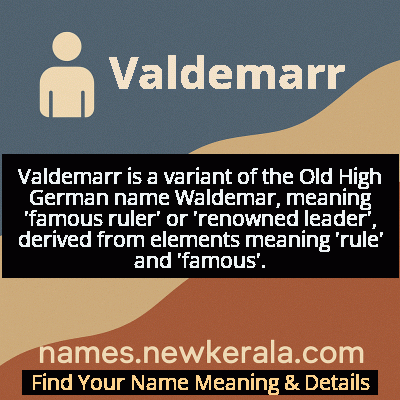Valdemarr Name Meaning & Details
Origin, Popularity, Numerology Analysis & Name Meaning of Valdemarr
Discover the origin, meaning, and cultural significance of the name VALDEMARR. Delve into its historical roots and explore the lasting impact it has had on communities and traditions.
Name
Valdemarr
Gender
Male
Origin
German
Lucky Number
4
Meaning of the Name - Valdemarr
Valdemarr is a variant of the Old High German name Waldemar, meaning 'famous ruler' or 'renowned leader', derived from elements meaning 'rule' and 'famous'.
Valdemarr - Complete Numerology Analysis
Your Numerology Number
Based on Pythagorean Numerology System
Ruling Planet
Uranus (Rahu)
Positive Nature
Strong sense of order, loyal, practical, and disciplined.
Negative Traits
Stubborn, overly serious, rigid, and prone to feeling restricted.
Lucky Colours
Blue, gray.
Lucky Days
Saturday.
Lucky Stones
Blue sapphire.
Harmony Numbers
1, 7, 8.
Best Suited Professions
Managers, engineers, accountants, organizers.
What People Like About You
Dependability, discipline, practicality.
Famous People Named Valdemarr
Valdemar I of Denmark
Monarch
Unified Denmark and established strong centralized rule
Valdemar II of Denmark
Monarch
Expanded Danish empire to its greatest territorial extent
Valdemar IV of Denmark
Monarch
Restored Danish kingdom after period of decline
Valdemar Psilander
Actor
Pioneering Danish silent film star with international recognition
Name Variations & International Equivalents
Click on blue names to explore their detailed meanings. Gray names with will be available soon.
Cultural & Historical Significance
In Germanic cultural memory, Valdemarr evokes the ideal of the 'law-giver king'—a ruler who combines military strength with administrative wisdom. The name's persistence through centuries reflects its deep embedding in historical consciousness, particularly in Denmark where Valdemar-era architecture, such as the reconstructed Vordingborg Castle, remains visible today. During the 19th century National Romantic movement, the name experienced renewed popularity as Scandinavians looked to their medieval past for cultural inspiration and national identity. This historical weight gives the name a gravitas that continues to resonate in modern times.
Extended Personality Analysis
Individuals bearing the name Valdemarr are often perceived as possessing natural leadership qualities combined with strategic intelligence. Historical associations with powerful medieval rulers create expectations of strength, determination, and the ability to command respect. Those named Valdemarr typically develop a strong sense of responsibility from an early age, often showing maturity beyond their years and a tendency to take charge in group situations. They tend to be methodical planners who consider long-term consequences, reflecting the name's association with kingdom-building and legacy creation.
Psychologically, the name suggests someone who values tradition and stability while being capable of innovation when necessary. Valdemarrs often exhibit a balance between assertiveness and diplomacy, understanding that true leadership requires both strength and wisdom. They may feel a sense of historical connection or family legacy, which can manifest as interest in history, genealogy, or cultural preservation. In social contexts, they're often seen as reliable anchors—people who remain calm under pressure and provide direction during uncertain times. The name's royal connotations can sometimes create internal pressure to achieve or lead, but also provides a strong foundation for developing self-confidence and purpose.
Modern Usage & Popularity
In contemporary naming practices, Valdemarr maintains a distinctive presence as a historically rich but uncommon choice. While it ranks outside the top 200 names in Scandinavian countries, it enjoys steady usage among families valuing historical connections and strong traditional names. The double 'r' spelling is particularly rare, making it an appealing option for parents seeking uniqueness without complete invention. Recent years have seen a modest increase in usage as part of the broader trend toward vintage and royal names, particularly in Denmark and Sweden where medieval history enjoys popular interest. The name appears occasionally in Germany and among Scandinavian diaspora communities in North America. Its rarity ensures that bearers stand out while its historical legitimacy prevents it from seeming trendy or fabricated. Modern Valdemarrs often benefit from the name's strong, positive associations while avoiding the overexposure of more common royal names like William or Charles.
Symbolic & Spiritual Meanings
Symbolically, Valdemarr represents the enduring power of legacy and the responsibility of leadership. The name evokes metaphorical connections to fortified structures—both physical castles and the psychological fortitude required for meaningful governance. It symbolizes the bridge between individual ambition and collective welfare, suggesting that personal power finds its highest expression in service to community. In esoteric traditions, the name's Germanic roots connect it to concepts of natural order and rightful authority, where 'wald' (rule) implies stewardship rather than domination.
The name carries deep metaphorical significance as a vessel for historical continuity, representing how individual lives connect to broader cultural narratives. It suggests that names aren't merely labels but containers of collective memory and aspiration. In psychological terms, Valdemarr symbolizes the integration of strength and wisdom—the ideal that true power derives from knowledge, experience, and ethical commitment rather than mere force. The name's royal associations metaphorically represent the 'sovereignty' each person can exercise over their own life direction while acknowledging their connection to larger historical and cultural currents.

